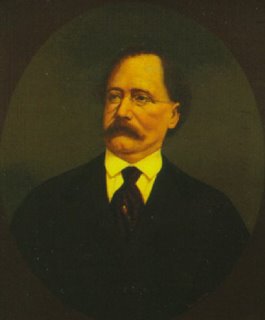
After the war, Levy resumed his career as a lawyer in Natchitoches. During the reorganization of the Democratic Party during the Reconstruction period, Levy remained politically active as evidenced by his attendance at the Democratic Party's 1872 convention in Baltimore as a Louisiana delegate. In April 1873, Levy announed the formation of a law partnership with E.L. Pierson, brother of the wife of Levy's brother, called "Levy & Pierson" (replacing "Pierson & Levy").
E. L. Pierson was a member of the state legislature and was murdered in December 1875 by J.H. Cosgrove, editor of Natchitoches' Vindicator newspaper. ("The difficulty orginated (sic) in a newspaper controversy, in which the epithets of coward, &c, were exchanged. Pierson was a Kelloggite ["radical republican" - DRW], Cosgrove a Democrat." Ouachita Telegraph, Dec. 31, 1875 at http://ftp.rootsweb.com/pub/usgenweb/la/natchito/history/piersonc.txt).
Levy was elected to the 44th Congress (March 1875 to March 1877) as a Democrat. Though he was not renominated for Congress in 1876, Levy spent his "lame duck" months actively involved in the Tilden-Hayes controversy. In the disputed presidential election of 1876, Louisiana was one of five states whose electoral votes were in contention (Florida was another of these states and William Purman played a major part in that controversy). The Louisiana gubernatorial election of November 1876 was similarly contested. Both the Republican and Democratic candidates declared victory. Louisiana’s Republican-controlled board of elections confirmed the Republican candidate as the winner. Levy denounced the actions of the Louisiana board of election before the House on Feb. 20, 1877. The New York Times contended that Levy played a leading part in the compromise that ended Democratic filibustering aimed at preventing the House’s certification of the presidential election in Hayes’ favor. The Times also insisted that Levy was a leader in devising the deal that accepted the Louisana board of election's determination in favor of Hayes’ winning that state's electoral votes in exchange for the recognition of the Democratic candidate as Louisiana's governor. Though historians dispute the existence of a “deal” to settle the election, the Times insisted that Levy’s speech on the floor of the House on March 1, 1877 was proof of such an arrangement. Levy was quoted as speaking in opposition to the Democratic filibuster that "I feel that sound policy and the paramount consideration of the salvation of the State and people of Louisiana require that their Representatives in this House should abstain from a futile attempt to nullify that decision, and thereby postpone the redemption which is essential to their very existence and from which alone they can expect peace and prosperity” (NYT, March 31, 1877). Louisiana's electoral votes were delivered to Hayes and the Democrats took control of Louisiana, effectively ending Reconstruction in that state.
In 1878, Levy formed a law partnership with Daniel C. Scarborough which contined until Levy's appointment in April 1880 by Governer Wiltz as an associate justice of the Louisiana Supreme Court. Levy died in August 14, 1882 at Saratoga Springs, NY at the age of 54. Levy's burial service was held at the Protestant Episcopal Church in Natchitoches on Dec. 11, 1882. Biographical sources indicate that Levy was buried at the American Cemetery in Natchitoches, but extensive indexes of graves at that place do not list his name. His widow, Catherine, died in New Orleans in 1900.
LEVY'S FAMILY
Charles H. Levy was most likely William's younger brother. Born on August 18, 1837, Charles Levy's biography lists him as a Virginia native and the youngest of seven children of John B. Levy, also a Virginian by birth who served in the War of 1812. The father John moved to Natchitoches in 1870, but moved the following year to Longview, Texas where he died in 1877 at the age of 89 (another source says he died on Dec. 29, 1880). Father John's wife, Emeline Butt (unclear if she was the mother of William), also a Virginia native, died in Texas in 1875 at the age of 72. Charles was educated in Portsmouth and entered the U.S. Navy's engineering corps. He resigned from the U.S. Navy in June 1861 and joined the Confederate Navy, being promoted to chief engineer in 1864. At the close of the war, Charles settled in Natchitoches. Like his brother, Charles became in involved in the Democratic Party and was elected justice of the peace in 1879. Charles and his wife, Emily Pierson, were members of the Episcopal Church and had six children, including one son named William M. Another brother, Richard Butt Levy Sr., was a trustee of the Presbytarian Church in Longview Texas and served as Texas Secretary of State for a number of years. Richard died in 1918.
1 comment:
Is the picture an actual one of William M. Levy?
Post a Comment